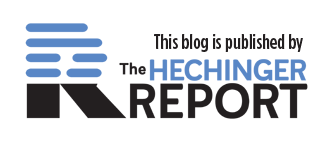The problem in judging colleges by graduation rates
Karen Gross, President of Southern Vermont College, has an interesting piece on vtdigger.org on why it’s not a good idea to judge a university or college by its graduation rate and the prospective earnings of its graduates. “…elite institutions, absent some adjustment, would rank higher than non-elite institutions on graduation rates without any explanation as to why […]
Survey: Student poverty is rising and so is teacher pay
Last week, the National Center for Education Statistics released the first results of its newest School and Staffing Survey, which is administered to teachers and administrators across the United States every four years. The survey, which is meant to examine the characteristics of public school districts, including average teacher salary, sizes and types of districts, […]
Only 6 percent of college students do work study
The National Center for education statistics reports that only 6 percent of undergraduates earn money through work study programs. Yet 71 percent receive some sort of financial aid, such as grants or loans. http://nces.ed.gov/pubsearch/pubsinfo.asp?pubid=2013165
Data Quality Campaign’s Aimee Rogstad Guidera discusses anti-data backlash and more
Aimee Rogstad Guidera founded the Data Quality Campaign in 2005 as a temporary advocacy group to get every state to set up its own longitudinal data system by 2009. Today, every state has a data system that tracks students from kindergarten onward. (edited for length and clarity) Q: Why didn’t you go out of business […]
MIT’s Resnick on uses and risks of data usage in education
I wrote this piece earlier this summer, looking at the use of technology in education. But our conversation wandered into the domain of data and I wanted to excerpt those parts of the interview for Education By The Numbers. MIT technology trailblazer is a critic of computerized learning Mitchel Resnick is the LEGO Papert Professor […]
Federal watchdog slams charter school data
The Government Accountability Office (GAO) issued a report in July, complaining that charter school data is so incomplete that it could not determine whether charter schools are avoiding non-English speaking students. “Specifically, for over one-third of charter schools, the field for reporting the counts of ELLs (English Language Learners) enrolled in ELL programs was left […]
A call for more data, and less anonymous data, to contain college costs
In Higher Education, Data Transparency, and the Limits of Data Anonymization, Reihan Salam in the online version of the National Review writes, “I am increasingly convinced that unless governments do a better job of measuring student learning and labor market outcomes, any reform efforts will be of limited use.” In the piece Salam cites an idea from Andrew P. […]
The education search engines are coming
Searching the internet for recipes, academic papers or ex boyfriends is easy. But if you’re a teacher looking for a lesson plan, a textbook excerpt, or a fun brain teaser to share with your class, good luck. For example, I just googled “multiplying exponents”. A bunch of results pop up. If you’re a parent, it […]
States and districts pull back from InBloom Data warehouse
InformationWeek Education has a good piece, with a punny wilting headline, on the growing backlash against InBloom’s plan to warehouse data for states and school districts. InformationWeek’s David F. Carr writes, “Louisiana withdrew from the project in April and other states who initially expressed an interest have backed off. Most recently, Politico reported that Guilford County, N.C., […]
Move over U.S. News, a new ranking for universities and scientific institutions
Mapping Scientific Excellence, a new website out of Germany, has come up with a novel way to rank the world’s best universities and scientific institutions. It ranks an institution’s excellence by the rate at which it produces scientific papers that are most frequently cited. An MIT Technology review of the site, which Lutz Bornmann at […]


